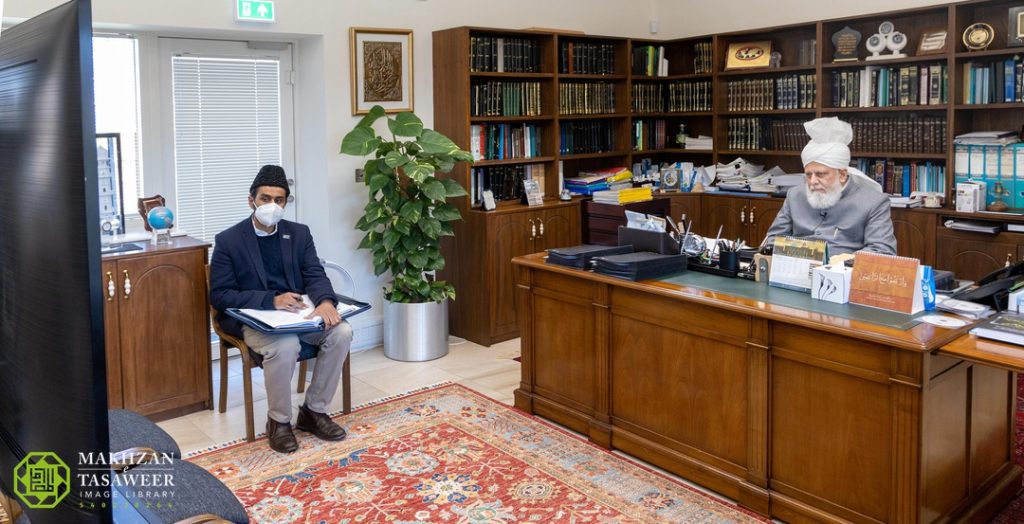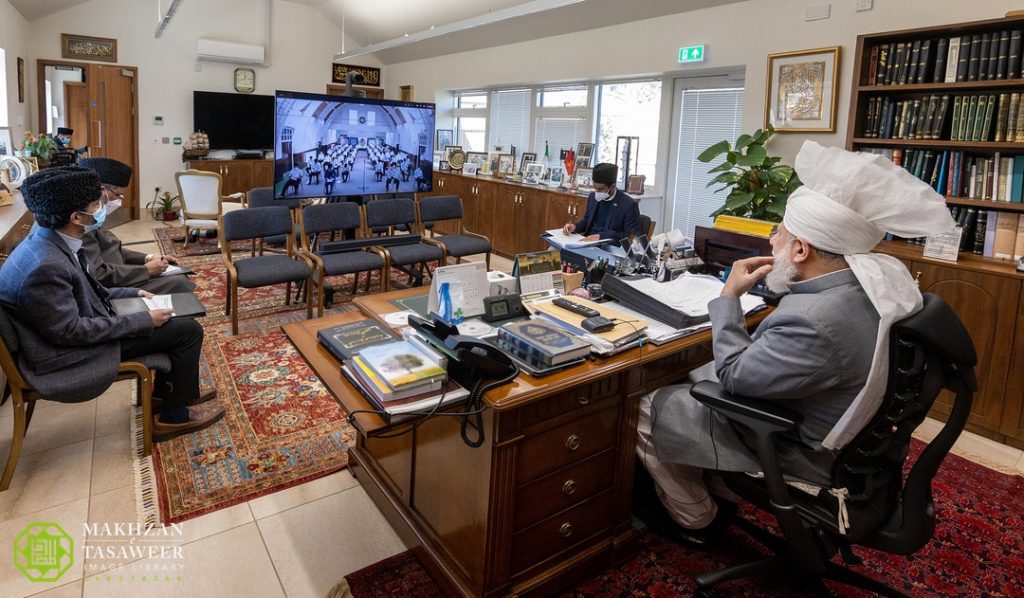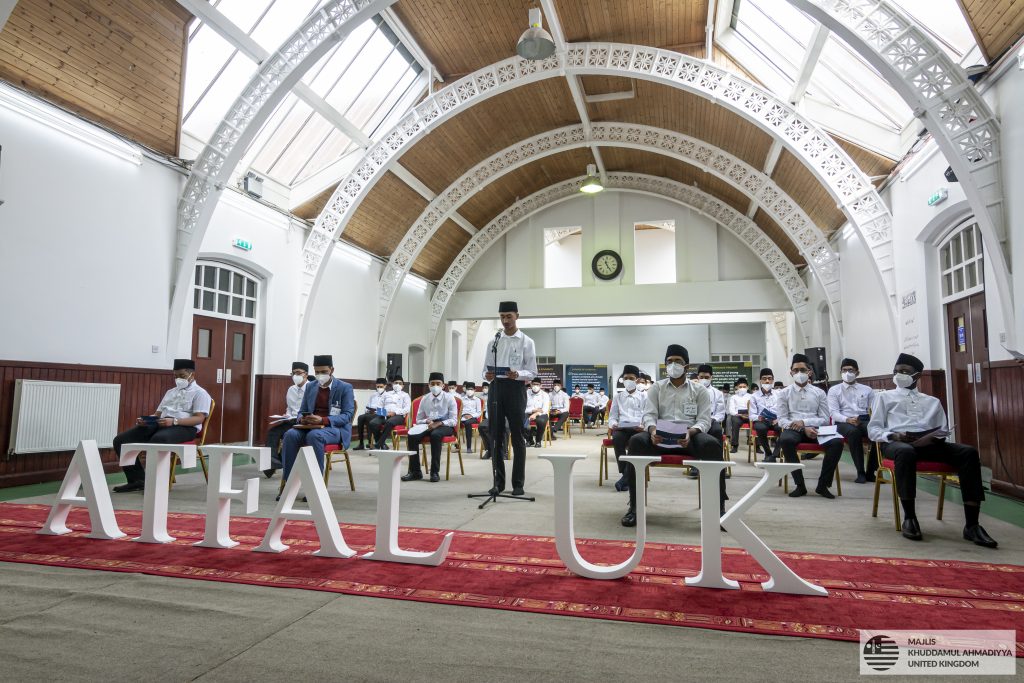On Sunday, 25 April 2021, 58 members of Majlis Atfal-ul-Ahmadiyya UK from Birmingham were blessed with the opportunity of meeting and having a class with Hazrat Khalifatul Masih Vaa in a virtual mulaqat.
During the class, Atfal had the opportunity to ask Hazrat Amirul Momineenaa various questions related to religion, Islam and day-to-day life.
As the live stream commenced, Huzooraa conveyed his salaam to everyone and enquired how many boys were seated in the hall. Mohtamim Atfal, Farhad Ahmad Sahib, stated that there were 58 Atfal were present.

The class then commenced with a recitation from the Holy Quran by Sabahat Aman. After the recitation of the Holy Quran, upon seeing Sabahat Aman’s beard, Huzooraa asked if he was in the last year of Atfal-ul-Ahmadiyya. The recitation of the Holy Quran was then followed by its English translation delivered by Bilal Akwasi Bonsu.
Thereafter, a hadith of the Holy Prophetsa was presented by Ashir Ahmad Khan, and its translation by Farhad Mirza. After this, Yousaf Syed Ahmadi had the opportunity to recite a qaseedah composed by the Promised Messiahas, followed by its translation which was presented by Naseer-ud-Din Ahmad.
Huzooraa then turned to Mohtamim Atfal, Farhad Ahmad Sahib, and asked what was next on the agenda. Farhad Sahib stated that there were some Atfal who wished to ask Hazrat Khalifatul Masih Vaa questions.
The first question was asked by Farhan Jamil regarding Huzoor’saa advice for new Ahmadi converts around the world. He said his family, who were of Sunni background, had recently converted to Ahmadiyyat. Farhan Jamil explained that he was born in Pakistan and came to the UK in 2011.
Whilst answering his question, Huzooraa said, “You converted to Ahmadiyyat from Sunni background, right?” To this, Farhan Jamil replied in the affirmative.
Hazrat Khalifatul Masih Vaa then said:
“[…] You already know that the Holy Quran is the holy book revealed to the Holy Prophet, peace and blessings of Allah be upon him, and this is the final law-bearing book; you already know that the Holy Prophet, peace and blessings of Allah be upon him, is Khatam-un-Nabiyyin, the seal of the prophets; he is the final law-bearing prophet and no other law-bearing prophet can come after him.
“This is what you know, right? So, the only difference between an Ahmadi and a non-Ahmadi Muslim is that you believe that the Messiah of the age, who was to come and whose advent was foretold and prophesied by the Holy Prophetsa, has come and you have accepted him […]
“Why did you do bai‘at? Because you knew that the prophecy of the Holy Prophet, on whom be peace, about the advent of the Promised Messiahas has been fulfilled and you are obeying the commandment of the Holy Prophet Muhammadsa that ‘whenever my Mahdi appears, you [must] accept him.
“Since you have accepted Ahmadiyyat, there should be some significant change in your lifestyle with regard to religious matters. People should know that now, after having accepted Ahmadiyyat, you are a changed person. You offer five daily prayers, if possible, in congregation; if not, then at least at home you can offer five daily prayers in congregation; read the Holy Quran daily and try to find out the commandments and injunctions given in the Holy Quran and try to practise those […]
“So, for a true Ahmadi, whether he is a new convert or an old Ahmadi, this should be the basic thing, that there should be a significant change which people should feel […] in this age, the literature given to us by the Promised Messiahas is the best literature through which we can comprehend religious knowledge more easily. So, we should try to read these books because the literature of the Promised Messiahas covers all the necessary teachings of Islam given in the Holy Quran and in ahadith”.
Following this, Zain Chaudhry stated that his grandparents were not Ahmadi and asked how he could spark within them an interest in Ahmadiyyat.
Answering this question, Hazrat Amirul Momineenaa said:
“[…] if they see that there is a significant change in your lifestyle, as I have already mentioned [in answer to the previous question] – that you are a practicing Muslim and they see their grandchild is offering five daily prayers; they see that their grandchild is reading the Holy Quran daily; they see their grandchild is morally better than the other grandchildren who are not Ahmadis – definitely, they will think, ‘What is special in Ahmadiyyat?’ […] So, try to be a practicing Ahmadi Muslim. In this way, you can also attract others towards Ahmadiyyat.”
Next, Nabil Ahmad Hamid had the opportunity to ask a question. He asked that when the coronavirus restrictions are eventually lifted, whether Hazrat Amirul Momineenaa would carry on doing virtual mulaqats along with the routine mulaqats.
Huzooraa stated:
“It is possible; it can be continued. Those Jamaat members who are living in far-off countries where I do not visit frequently, obviously, they might [continue to have] virtual mulaqats with me. But people like you who are just living here – 100 miles from London – can easily come to see me.
“Would you prefer to have a virtual mulaqat or physical mulaqat?” To this, Nabil Ahmad Hamid replied, “Physical mulaqat, Huzoor.”
Hazrat Amirul Momineenaa then smiled and said, “For you, it is physical, and for those countries whose people cannot come to the UK easily, it is quite possible that we shall have virtual mulaqats […]”
Next to seek guidance was Adil Ahmad Farooqi who asked Hazrat Amirul Momineenaa what a tifl’s daily routine should consist of. Whilst offering direction and guidance, Huzooraa explained:
“[…] a tifl between the ages of 7-10 should try to regulate his life by offering daily prayers […] when you are 10 years of age, then it is obligatory on you to offer five daily prayers.
“The routine should be that you get up early in the morning, offer the Fajr prayer and do tilawat of the Holy Quran – even if it is one ruku or two. Then, if there is enough time to have a short nap, you can go to bed again and have a nap for half an hour, or if you have enough time, you can sleep for two hours […]
“Then get up and get yourself prepared for school, go to school and spend your day in school. There, you should also behave well with your fellow students.
“When you come back from school, do your homework and also try to do some extra work […]”
With regard to offering Salat in school, Huzooraa said:
“If there is no time to offer [Zuhr prayer] between the closing of the school and reaching back home, then you should ask your teacher, or headteacher, to allocate some place [at school] to offer your Zuhr prayer there. And if the time is too short, then you can offer the Zuhr and Asr prayer together […]
“Then, after that, you should play outside for one hour, if there is time to play for one hour – during the summer, you can easily play for one hour. You can play football, or cricket, or hockey, or rugby, or anything you like. Then offer your Maghrib prayer; then try to read some books – either religious books or other storybooks – to increase your knowledge and also try to read the newspapers to increase your secular knowledge.
“Then, after having your dinner, offer Isha prayer, and then go to bed as early as possible so that you wake up early.”
Hazrat Amirul Momineenaa then quoted the saying, “Early to bed and early to rise, makes a man healthy, wealthy and wise.”

Hazrat Khalifatul Masih Vaa was then asked by Ashir Ahmad Khan how one can take care of elderly people.
Huzooraa explained:
“Those who are your immediate relatives – your grandparents, even your uncles, your father’s uncles and mother’s uncles, or their elder brothers and sisters – if they need your help, you should help them […]”
Huzooraa further said that after coming from school and completing homework, Atfal should dedicate some time for them. In this way, Huzooraa said, “You can emotionally help them, and they will be happy; they will pray for you and you need the prayers of your parents and grandparents.”
Next, Mekail Malak asked Huzooraa about the criteria of praying and having one’s prayer accepted by Allah. Explaining this matter, Hazrat Amirul Momineenaa said:
“You see, the criterion is to always seek Allah’s help and beseech His help and do dua for good things […] the criterion is to always seek Allah’s help in everything good, then Allah Almighty will help you […] you should do istighfar also so that Allah the Almighty saves you from bad things.” Huzooras further stated that one should also recite durood sharif as the Holy Prophetsa once stated that prayers are further strengthened and accepted by reciting durood sharif.
Mekail Malak further stated that he had been praying to Allah the Almighty for some time. Huzooraa smiled and stated:
“Allah the Almighty knows better. He has knowledge of everything. He knows whether the thing you are asking for is good for you or not. If Allah the Almighty feels that it is not good for you, He will not accept it. If you are offering the five daily prayers and you are a true and practicing Muslim, who fears Allah, does istighfar and recites durood sharif, even then, if Allah does not accept it, it means that the thing you are asking for is not good for you […] you must have a firm belief that Allah will give you a good thing, not a bad thing.”
Next, Danial Ahmad asked Huzooraa how he could become more confident. Observing the way he spoke, Huzooraa remarked, “You seem like a very confident person.”
Huzooraa further asked him about school and if he was good in his studies, to which he replied in the affirmative. Huzooraa then said:
“Then, it should be enough for you to get confidence […] And then, also, offer the five daily prayers and seek Allah the Almighty’s help, that He gives you more confidence and makes you a good asset for the Jamaat and for humanity.”
Huzooraa then told him to be determined and work hard.
Bilal Akwasi Bonsu, a 15-year-old tifl, asked that as it was not compulsory for young children to fast, what else could children do during the month of Ramadan to reap God’s blessings.
Huzooraa said:
“[…] at the age of 15, on alternative days, you can fast. So in this way, you can observe 15-16 fasts. But, apart from fasting during the month of Ramadan, you should also be more careful towards your prayers. Offer your prayers fervently, and not only pray the five daily prayers but also do some extra prayers – nawafil, Tahajud […] and then try to read the Holy Quran and finish it at least once during the month of Ramadan.”

Next, Tauqeer Ahmad asked Hazrat Khalifatul Masih Vaa how much time he spent preparing the Friday Sermons.
Huzooraa smiled and said:
“It depends on the topics; sometimes it takes me 20 hours, 30 hours, four days, five days; sometimes it takes me 2-3 hours. So, it all depends on the topic […]”
Ehsan Falkaner was next to ask his question. He enquired from Huzooraa what had happened to Pharoah’s body at the time of Prophet Mosesas.
Huzooraa said:
“[…] as promised by Allah Almighty, as is mentioned in the Holy Quran […] his body was saved, and he was in a coma and after some time, he died. And after that, as it was the normal practice in Egypt for the bodies to be mummified, his body, as a king, was mummified.”
Then, Nasser-ud-Din Ahmad stated he was currently trying to learn Urdu. He asked Hazrat Khalifatul Masih Vaa how he could learn Urdu. Answering him, Huzooraa said:
“You should try to read small children’s books [in the language you are learning]. Try to learn Urdu by reading the small books […] and then also talk to your grandfather [in Urdu] for half an hour, daily […] practice makes a man perfect. You will have to practise.”
Hazrat Khalifatul Masih Vaa then said that those who were unable to ask a question may write a letter to him and he said that he would reply to their letters.
At this, Hazrat Khalifatul Masihaa conveyed his salaam and the meeting came to a close.
(Report prepared by Al Hakam)

